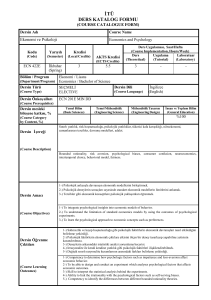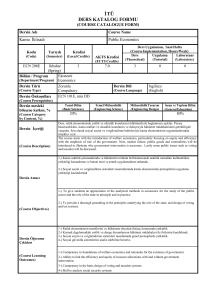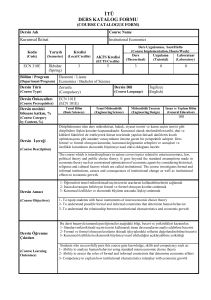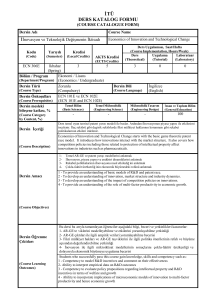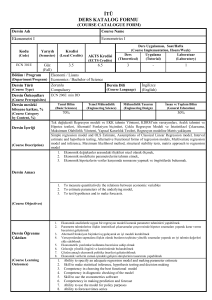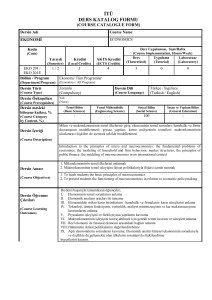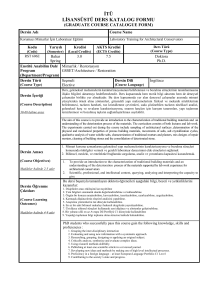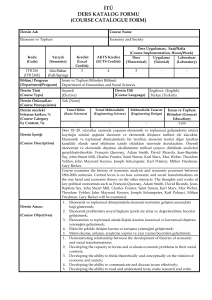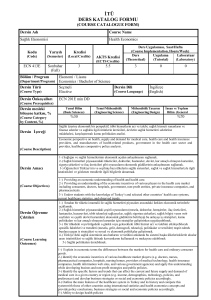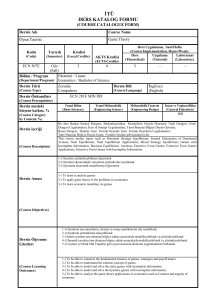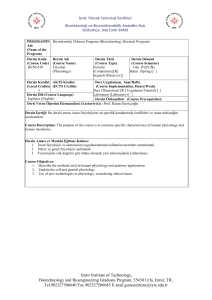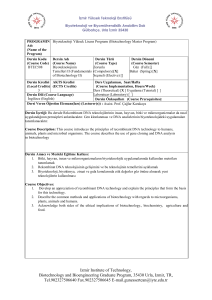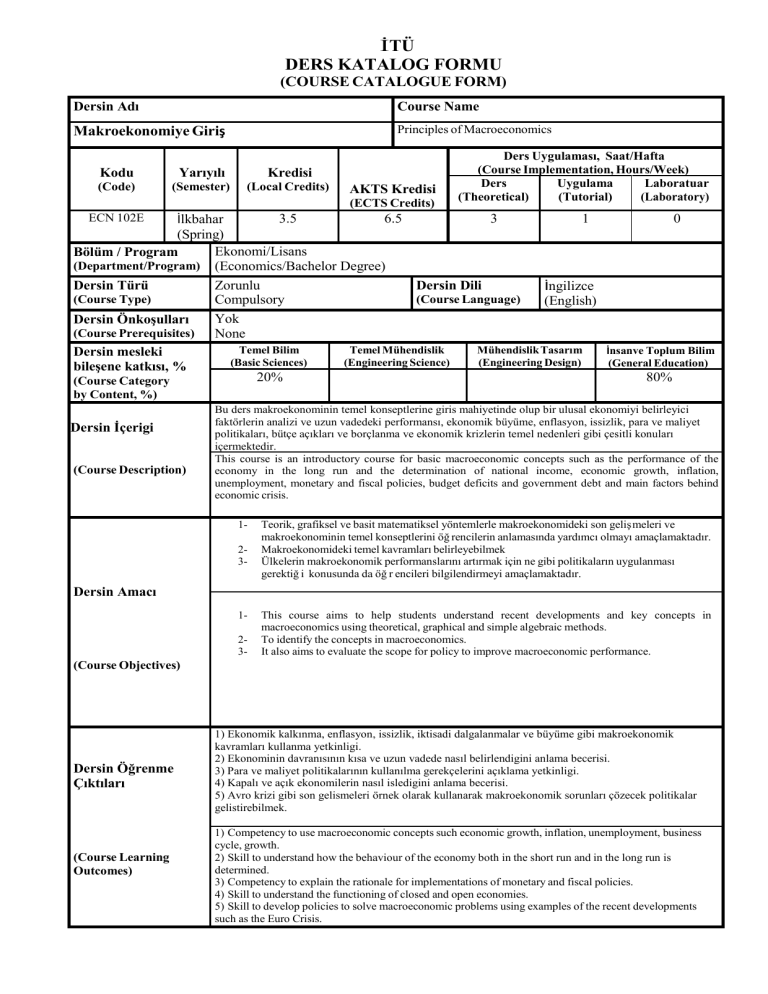
İTÜ
DERS KATALOG FORMU
(COURSE CATALOGUE FORM)
Dersin Adı
Course Name
Makroekonomiye Giriş
Principles of Macroeconomics
Kodu
Yarıyılı
Kredisi
(Code)
(Semester)
(Local Credits)
AKTS Kredisi
(ECTS Credits)
Ders Uygulaması, Saat/Hafta
(Course Implementation, Hours/Week)
Ders
Uygulama
Laboratuar
(Theoretical)
(Tutorial)
(Laboratory)
ECN 102E
3.5
6.5
3
1
0
İlkbahar
(Spring)
Ekonomi/Lisans
Bölüm / Program
(Department/Program) (Economics/Bachelor Degree)
Zorunlu
Dersin Türü
Dersin Dili
İngilizce
(Course Type)
(Course Language)
Compulsory
(English)
Yok
Dersin Önkoşulları
(Course Prerequisites)
None
Temel Bilim
Temel Mühendislik
Mühendislik Tasarım
İnsanve Toplum Bilim
Dersin mesleki
(Basic
Sciences)
(Engineering
Science)
(Engineering Design)
(General Education)
bileşene katkısı, %
20%
80%
(Course Category
by Content, %)
Dersin İçerigi
(Course Description)
Bu ders makroekonominin temel konseptlerine giris mahiyetinde olup bir ulusal ekonomiyi belirleyici
faktörlerin analizi ve uzun vadedeki performansı, ekonomik büyüme, enflasyon, issizlik, para ve maliyet
politikaları, bütçe açıkları ve borçlanma ve ekonomik krizlerin temel nedenleri gibi çesitli konuları
içermektedir.
This course is an introductory course for basic macroeconomic concepts such as the performance of the
economy in the long run and the determination of national income, economic growth, inflation,
unemployment, monetary and fiscal policies, budget deficits and government debt and main factors behind
economic crisis.
123-
Teorik, grafiksel ve basit matematiksel yöntemlerle makroekonomideki son gelişmeleri ve
makroekonominin temel konseptlerini öğ rencilerin anlamasında yardımcı olmayı amaçlamaktadır.
Makroekonomideki temel kavramları belirleyebilmek
Ülkelerin makroekonomik performanslarını artırmak için ne gibi politikaların uygulanması
gerektiğ i konusunda da öğ r encileri bilgilendirmeyi amaçlamaktadır.
Dersin Amacı
123-
This course aims to help students understand recent developments and key concepts in
macroeconomics using theoretical, graphical and simple algebraic methods.
To identify the concepts in macroeconomics.
It also aims to evaluate the scope for policy to improve macroeconomic performance.
(Course Objectives)
Dersin Öğrenme
Çıktıları
(Course Learning
Outcomes)
1) Ekonomik kalkınma, enflasyon, issizlik, iktisadi dalgalanmalar ve büyüme gibi makroekonomik
kavramları kullanma yetkinligi.
2) Ekonominin davranısının kısa ve uzun vadede nasıl belirlendigini anlama becerisi.
3) Para ve maliyet politikalarının kullanılma gerekçelerini açıklama yetkinligi.
4) Kapalı ve açık ekonomilerin nasıl isledigini anlama becerisi.
5) Avro krizi gibi son gelismeleri örnek olarak kullanarak makroekonomik sorunları çözecek politikalar
gelistirebilmek.
1) Competency to use macroeconomic concepts such economic growth, inflation, unemployment, business
cycle, growth.
2) Skill to understand how the behaviour of the economy both in the short run and in the long run is
determined.
3) Competency to explain the rationale for implementations of monetary and fiscal policies.
4) Skill to understand the functioning of closed and open economies.
5) Skill to develop policies to solve macroeconomic problems using examples of the recent developments
such as the Euro Crisis.
Ders Kitabı
(Textbook)
Diğer Kaynaklar
(Other References)
GREGORY MANKIW, MACROECONOMICS, 8TH EDITION (INTERNATIONAL
EDITION), WORTH PUBLISHERS, 2013.
OLIVIER BLANCHARD AND DAVID JOHNSON, MACROECONOMICS, 6TH EDITION
(GLOBAL EDITION), PEARSON, 2012.
Ödevler ve Projeler
1)
Ders kitabından problemler.
(Homework & Projects
1)
Problem sets from textbook.
Laboratuar Uygulamaları
(Laboratory Work)
Bilgisayar Kullanımı
(Computer Use)
Diğer Uygulamalar
1) Ödev ve diger problem çözümleri
(Other Activities)
1) Solutions to homeworks and other problems
Baş arı
Değerlendirme
Sistemi
Faaliyetler
(Activities)
Yıl içi Sınavları
(Midterm Exams)
Kısa Sınavlar
(Quizzes)
Ödevler
(Homework)
Projeler
(Projects)
Dönem Ödevi/Projesi
(Term Paper/Project)
Laboratuar Uygulaması
(Laboratory Work)
Diğer Uygulamalar
(Other Activities)
Final Sınavı
(Final Exam)
(Assessment Criteria)
Adedi
(Quantity)
1
Değerlendirmedeki Katkısı, %
(Effects on Grading, %)
30%
2
10%
5
20%
1
40%
DERS PLANI
Hafta
1
2
3
4
5
6
7
8
9
10
11
12
13
14
Konular
Makroekonomiye giriş ve dünya ekonomisi hakkında temel verilerin sunumu
Ekonomide Genel Denge
Para ve Enflasyon
İş piyasası ve işsizlik
Ekonomik Büyüme: Solow Modeli
Ekonomik Büyüme: Endojen Büyüme Modeli
Açık Ekonomi
Ekonomik dalgalanma ve istikrar politikası
Devlet borçlanması ve Mali Sürdürülebilirlik
Para arzı ve bankacılık sistemi
Asimetrik enformasyon ve kredi piyasaları
Finansal Regulasyon
Kredi Daralması
Konuların Genel Özeti
Dersin
Çıktıları
1,2
1,2
2,3
2,4
2,4
2,4
3,4
2,3
2,4
3,5
3,5
3,5
3,5
3,4,5
COURSE PLAN
Weeks
1
2
3
4
5
6
7
8
9
10
11
12
13
14
Topics
Introduction to macroeconomics and presentation of the stylized facts of the World economy
General Equilibrium
Money and Inflation
Labour markets and unemployment
Economic Growth: Solow Model
Economic Growth: Endogenous Growth Model
Open Economy
Economic Fluctuations and Stabilization Policy
Government Debt and Fiscal Sustainability
Money supply and the banking system
Asymmetric information and credit markets
Financial Regulation
Credit Crunch
Overview of the topics
Course
Outcomes
1,2
1,2
2,3
2,4
2,4
2,4
3,4
2,3
2,4
3,5
3,5
3,5
3,5
3,4,5
Dersin Ekonomi Lisans Programıyla İliş kisi
Katkı
Seviyesi
Programın mezuna kazandıracağı bilgi ve beceriler (programa ait çıktılar)
a
b
c
d
e
f
g
h
1
Ekonomik ve sosyal problemleri, temsili aktörlerin amaç fonksiyonlarını bir takım kısıtlara tabi
olarak maksimize ettikleri ve buna baglı olarak çesitli tarz dengelerin olustugu ortamlar seklinde
matematiksel olarak modelleyen iktisadi yaklasımda yetkinlik.
Mikroiktisadi fiyat sistemini özel ve kamu malları ve uluslar arası ticaret baglamında ögrenip is
stratejileri ve kamu politikaları tasarımında etkinlik ve esitlik dengesini gözeterek hukuk
çerçevesinde kullanabilme yetkinligi. Bulguları Türkçe veya ingilizce olarak ifade edebilmek.
Fiyatların genel düzeyi, issizlik ve çıktı düzeyine iliskin temel makroekonomik modelleri insa
edebilme kabiliyeti. Bulguları Türkçe veya ingilizce olarak ifade edebilme becerisi.
Ekonomik büyüme ve teknolojik gelismenin belirleyenlerini, sosyal fayda ve sosyal maliyetlerini
degerlendirebilme kabiliyeti.
İstatistiki ve ekonometrik modelleme ve yöntemleri iktisadi ve sosyal verilerin bilgisayar
ortamında analiz edilmesinde ve yorumlanmasında temel düzeyde kullanabilme yetkinligi.
Bulguları Türkçe veya ingilizce olarak ifade edebilme becerisi.
Bir sektörün ekonomisinde uzmanlık gelistirme kabiliyeti. Yerli veya yabancı bir ülkedeki bir
sektörde uzmanlık.
Karar verme alanındaki standart iktisadi modellerde ve karar vermeye iliskin alternatif
varsayımlarda yetkinlik.
Yurt içinde veya dısındaki ekonomik kurumlar ve düzenlemeleri, tarihi, hukuki ve sosyal altyapıyı
dikkate alarak analiz etme yetkinligi. Bu tür bir analizi sektörel uzmanlıkla birlestirme becerisi.
2
3
x
x
x
x
x
x
x
x
1: Az, 2. Kısmi, 3. Tam
Relationship between the Course and Computer Engineering Curriculum
Economics Department B.S. Program Outcomes and Performance Criteria
a
b
c
d
e
f
g
h
Competency in the fundamental economic approach that models economic and social problems
mathematically as environments with various types of equilibria where representative agents
maximize their objective functions subject to a set of constraints.
Competency in the microeconomic price system in the context of private and public goods and
international trade, and the ability to design business strategies and public policies considering
efficiency-equity balance and the legal framework. Skill to express findings in Turkish or
English.
Ability to construct basic macroeconomic models regarding the general price level,
unemployment, and output. Skill to express findings in Turkish or English.
Ability to assess the social benefits, costs, and determinants of economic growth and
technological advancement.
Competency in statistical and econometric modeling and methods to analyze and interpret at a
basic level economic and social data in a computerized environment. Skill to express findings
in Turkish or English.
Ability to develop expertise in the economics of a sector. Specialty in a domestic or foreign
sector.
Competency in economic models of decision making and in alternative assumptions related to
decision-making.
Competency to analyze domestic or foreign economic institutions and regulations considering
the historical, legal, and social infrastructure. The skill to combine such an analysis with
sectoral expertise.
Level of
Contribution
1
2
3
x
x
x
x
x
x
x
x
1: Little, 2. Partial, 3. Full
Düzenleyen (Prepared by)
Tarih (Date)
18.07.2014
İmza (Signature)

